- Gross National Happiness and Sustainable Tourism
- Ecotourism Amidst Pristine Landscapes
- Carbon-Neutral Travel
- Preserving Bhutanese Heritage
- Community-Based Tourism
- Responsible Trekking
- Eco-Friendly Accommodations
- Bhutan's Wildlife Conservation Efforts
- Fair Trade and Local Crafts
- Practical Tips for Sustainable Travelers
- Frequently Asked Questions For Sustainable Travel In Bhutan
Embark on a journey to Bhutan, where the very essence of travel intertwines seamlessly with the nation's unwavering commitment to sustainability. Nestled within the majestic Himalayas, Bhutan is not just a destination; it is a living testament to harmonious coexistence between humanity and nature. As you traverse this enchanting kingdom, you'll discover a realm where Gross National Happiness takes precedence over GDP, and where the concept of sustainable travel is not merely a trend but a way of life. Bhutan's pristine landscapes, adorned with ancient monasteries and vibrant prayer flags, serve as a canvas for an extraordinary adventure that transcends traditional tourism. This Himalayan gem stands as a beacon of responsible travel, preserving its rich cultural heritage and natural wonders while inviting visitors to participate in a transformative journey that fosters a deeper connection with the environment and the soul. Welcome to Bhutan, where every step is a pledge to a sustainable and meaningful exploration.
Gross National Happiness and Sustainable Tourism
In the heart of the Eastern Himalayas lies Bhutan, a kingdom that treasures not only its pristine landscapes but also the happiness and well-being of its people. At the core of Bhutan's unique approach to development is the philosophy of Gross National Happiness (GNH). This holistic and sustainable vision extends to the realm of tourism, creating an extraordinary travel experience that goes beyond the ordinary. In this article, we delve into the symbiotic relationship between Gross National Happiness and sustainable tourism in Bhutan.
Understanding Gross National Happiness (GNH)
Bhutan's commitment to GNH, introduced by the Fourth King, Jigme Singye Wangchuck, goes beyond traditional measures of economic success. It encompasses nine domains, including psychological well-being, health, education, time use, cultural diversity, good governance, community vitality, ecological diversity, and living standards. GNH reflects a holistic approach to development that considers the spiritual, physical, and emotional well-being of its citizens.
The Four Pillars of Gross National Happiness
GNH is supported by four pillars that form the foundation of Bhutan's unique development model:
- Sustainable and Equitable Socio-Economic Development: Bhutan places importance on balanced economic growth that benefits all citizens, ensuring that development is sustainable and equitable.
- Conservation of the Environment: The kingdom is dedicated to preserving its rich biodiversity and maintaining a carbon-neutral status. Conservation efforts are integrated into policies and practices to protect the environment for future generations.
- Preservation and Promotion of Culture: Bhutanese culture, deeply rooted in Buddhism, is safeguarded through various measures. The promotion of traditional arts, language, and values is integral to preserving the country's unique identity.
- Good Governance: Bhutan's governance model focuses on transparency, accountability, and citizen participation. Good governance is seen as crucial for the well-being of the nation.
Sustainable Tourism and GNH
Bhutan's commitment to Gross National Happiness is seamlessly woven into its approach to tourism. The government recognizes the impact of tourism on the environment and culture and has implemented policies to ensure that tourism aligns with the principles of GNH.
- Limited and High-Value Tourism: Bhutan follows a "High-Value, Low-Impact" tourism policy, restricting the number of visitors to preserve the environment and culture. This approach ensures that tourism contributes significantly to the country's economy without compromising its values.
- Community Involvement: Community-based tourism initiatives empower local communities, allowing them to actively participate in and benefit from the tourism industry. Visitors can engage with local traditions, crafts, and daily life, fostering a sense of cultural exchange.
- Preservation of Natural Heritage: Bhutan's commitment to maintaining a carbon-neutral status extends to its tourism industry. Sustainable practices, such as eco-friendly accommodations and responsible trekking, help protect the country's natural heritage.
Bhutan's pursuit of Gross National Happiness and sustainable tourism is a testament to its dedication to creating a harmonious and balanced society. As you embark on a journey to Bhutan, you become part of this unique vision, contributing to the preservation of the kingdom's natural beauty, cultural richness, and the well-being of its people. In Bhutan, happiness is not just a destination; it's the journey itself.
Ecotourism Amidst Pristine Landscapes
Nestled in the lap of the Eastern Himalayas, Bhutan beckons travelers with its breathtaking landscapes, where snow-capped peaks, dense forests, and meandering rivers create a canvas of unparalleled beauty. Beyond its scenic grandeur, Bhutan stands as a beacon of ecotourism, a realm where sustainable travel harmoniously coexists with the preservation of pristine environments. In this overview, we delve into the allure of ecotourism in Bhutan and how it intertwines with the kingdom's commitment to sustainability.
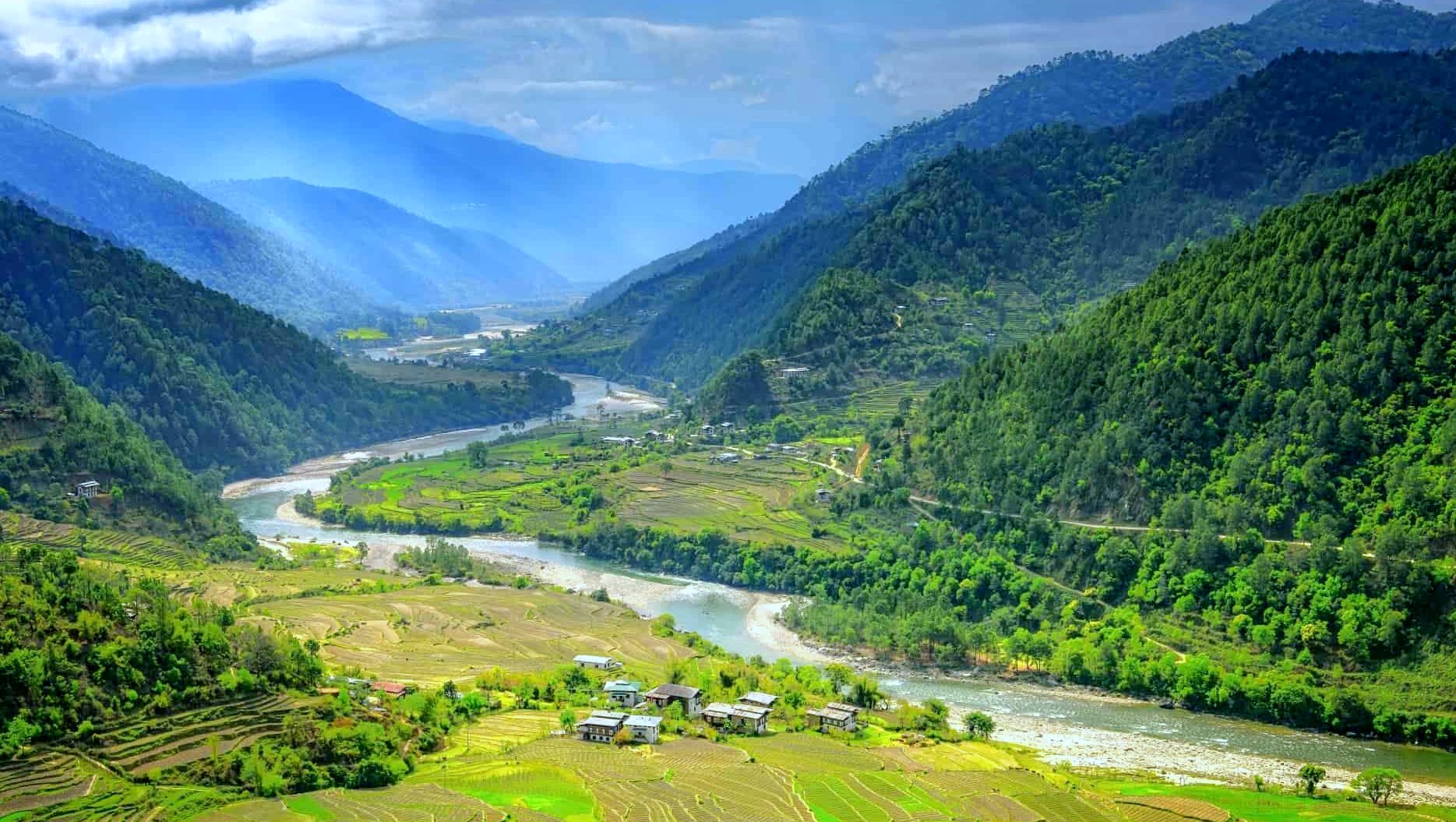
- Bhutan's Natural Splendor: Bhutan's landscapes are nothing short of a masterpiece, with diverse ecosystems ranging from lush subtropical plains to towering alpine peaks. The kingdom's commitment to preserving these natural treasures is reflected in its policies and practices, making it a haven for ecotourists seeking an unspoiled haven.
- Low-Impact Exploration: As you traverse Bhutan's enchanting landscapes, you'll discover a commitment to low-impact exploration. The country's "High-Value, Low-Impact" tourism policy ensures that the number of visitors is controlled, minimizing the environmental footprint and allowing travelers to immerse themselves in nature responsibly.
- Biodiversity Conservation: Bhutan boasts an incredible richness of biodiversity, with protected areas and national parks dedicated to preserving the kingdom's unique flora and fauna. Ecotourists can explore these areas with the assurance that their presence contributes to the ongoing conservation efforts.
- Responsible Trekking: Bhutan's mountainous terrain offers a playground for trekkers, and the emphasis is on responsible trekking. Trails are designed to minimize disturbance to ecosystems, and travelers are encouraged to follow sustainable trekking practices, leaving no trace behind.
- Eco-Friendly Accommodations: Immerse yourself in Bhutanese hospitality while staying in accommodations that prioritize eco-friendly practices. From boutique lodges to traditional guesthouses, these establishments are committed to sustainability, ensuring that your stay aligns with the principles of ecotourism.
- Cultural Integration with Nature: Bhutanese culture is deeply intertwined with nature, and ecotourism provides an opportunity to witness this harmonious relationship. From traditional farming practices to festivals celebrating the environment, travelers can experience a culture that reveres and respects the natural world.
- Supporting Local Conservation Initiatives: Your journey through Bhutan actively supports local conservation initiatives. Whether contributing to community-based projects or participating in wildlife monitoring programs, ecotourism in Bhutan is a dynamic collaboration between travelers and local communities in the pursuit of environmental preservation.
Embarking on a journey of ecotourism in Bhutan is not merely a travel experience; it's a conscious decision to explore and appreciate the kingdom's natural wonders in a sustainable manner. As you traverse the pristine landscapes, you become a steward of Bhutan's environmental legacy, leaving behind only footprints of admiration and respect. Bhutan's commitment to ecotourism is an invitation to discover the profound connection between humanity and the natural world, fostering a sustainable travel experience that leaves an enduring impact.
Carbon-Neutral Travel
In the quest for sustainable travel, Bhutan stands as a shining example, not only for its stunning landscapes but for its steadfast commitment to carbon-neutral travel. Tucked away in the Eastern Himalayas, this kingdom has embraced a unique approach, ensuring that every footstep taken by travelers leaves a minimal carbon footprint. Join us as we explore the enchanting world of carbon-neutral travel in Bhutan and discover how this destination is leading the way towards a greener, more responsible tourism future.
- Bhutan's Carbon-Neutral Pledge: Bhutan holds the distinction of being the world's only carbon-neutral country, a testament to its dedication to environmental sustainability. The kingdom's lush forests absorb more carbon dioxide than its industries and population generate, creating a carbon-neutral balance that is a beacon for environmentally conscious travelers.
- Eco-Friendly Transportation: From the moment you arrive in Bhutan, you'll notice the emphasis on eco-friendly transportation. The use of electric vehicles and a focus on public transport options minimize the impact on the environment. Traveling through Bhutan becomes a seamless blend of exploration and ecological mindfulness.
- Sustainable Tourism Practices: Bhutan's commitment to "High-Value, Low-Impact" tourism extends to its carbon-neutral ethos. By controlling the number of visitors, the kingdom ensures that tourism does not compromise its carbon-neutral status, creating a sustainable model where travel contributes positively to the environment.
- Responsible Trekking and Outdoor Activities: As you explore Bhutan's majestic landscapes, responsible trekking practices further emphasize the commitment to carbon-neutral travel. Thoughtfully planned trekking routes and outdoor activities ensure minimal disruption to the environment, allowing travelers to connect with nature without leaving a lasting impact.
- Eco-Friendly Accommodations: Bhutanese hospitality embraces eco-friendly accommodations, providing travelers with a range of options that align with sustainable practices. From energy-efficient lighting to waste reduction initiatives, these establishments contribute to the overall carbon-neutral experience.
- Carbon Offsetting Initiatives: Bhutan's dedication to carbon neutrality extends beyond its borders. The kingdom actively engages in carbon offsetting initiatives, such as afforestation and reforestation projects. Travelers can participate in or support these initiatives, further contributing to the preservation of Bhutan's carbon-neutral balance.
- Educational Experiences on Climate Action: Carbon-neutral travel in Bhutan goes beyond minimizing impact; it also offers educational experiences on climate action. Travelers have the opportunity to learn about Bhutan's sustainable practices and carry these lessons back home, becoming ambassadors for responsible tourism.
Embarking on a journey of carbon-neutral travel in Bhutan is not just an exploration of stunning landscapes; it's a commitment to a sustainable future. As you traverse the kingdom, you become part of a collective effort to preserve Bhutan's carbon-neutral status, leaving behind a legacy of responsible tourism. Bhutan invites you to experience the beauty of the Himalayas with a conscience, where every adventure contributes to the preservation of this pristine destination for generations to come.
Preserving Bhutanese Heritage
In the heart of the Eastern Himalayas lies Bhutan, a kingdom not just known for its awe-inspiring landscapes but also for its unwavering commitment to preserving its rich cultural heritage. As you embark on a journey through this mystical realm, you'll find that sustainable travel in Bhutan is intrinsically linked to the protection and promotion of its unique heritage. Join us on an overview of how Bhutan seamlessly combines the preservation of its cultural legacy with sustainable tourism practices.
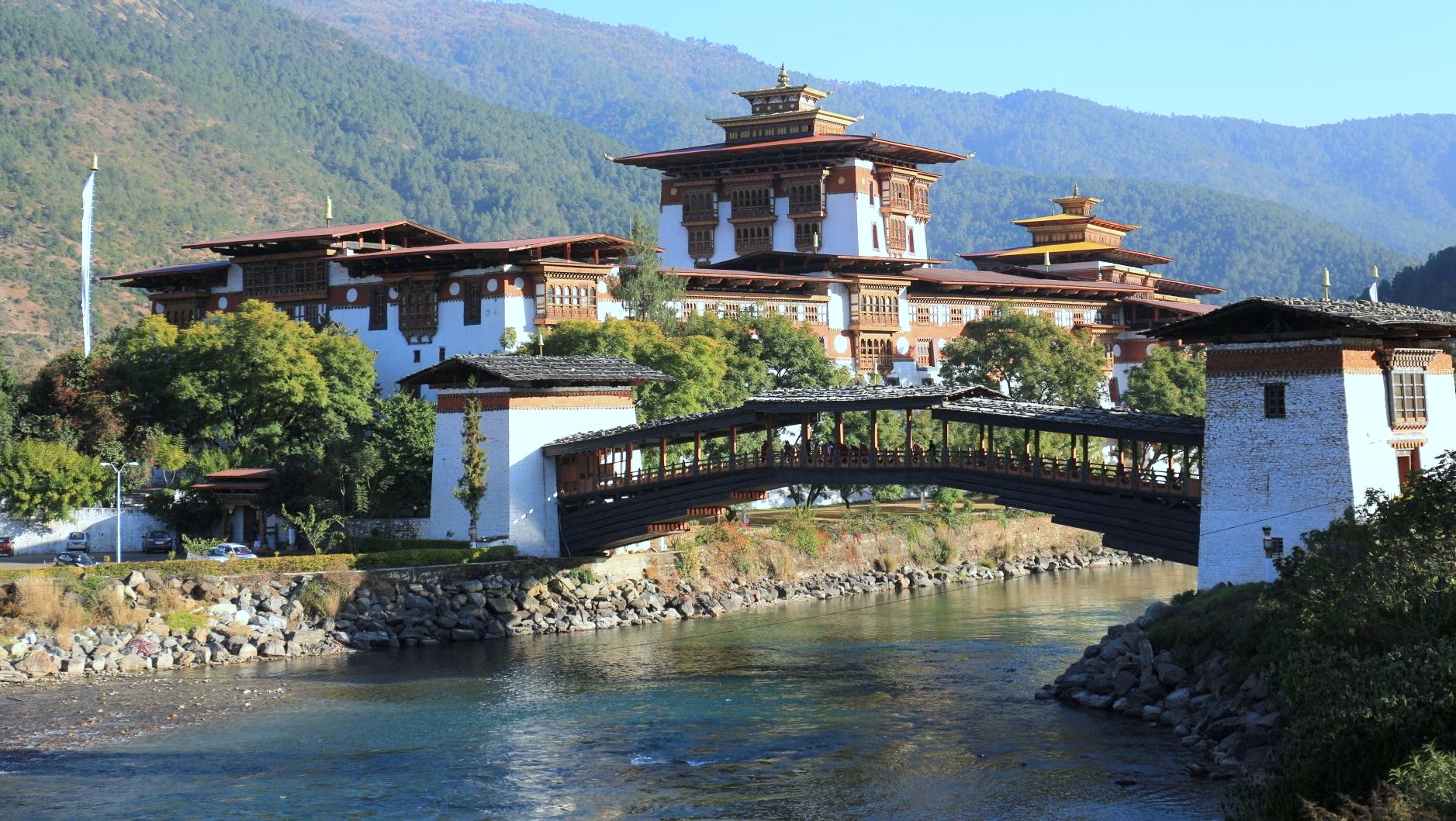
- Guardians of Tradition: Bhutanese culture, deeply rooted in Buddhism, has been carefully preserved for centuries. The people of Bhutan take pride in their traditional dress, architecture, festivals, and ceremonies. Sustainable travel in Bhutan ensures that this cultural tapestry remains vibrant and unblemished.
- Preservation of Ancient Monasteries and Dzongs: Bhutan is home to ancient monasteries and dzongs (fortresses) that stand as architectural marvels. These structures are not just tourist attractions but integral parts of Bhutanese life. Sustainable tourism initiatives focus on the preservation and restoration of these cultural landmarks, allowing visitors to witness the timeless beauty of Bhutan's architectural heritage.
- Cultural Immersion Experiences: Sustainable travel in Bhutan invites you to go beyond being a spectator; it encourages cultural immersion. Engage in traditional ceremonies, witness mask dances during festivals, and participate in local customs. These experiences not only enrich your journey but also contribute to the preservation of Bhutanese heritage.
- Promotion of Traditional Arts and Crafts: Bhutanese art and craftsmanship are deeply embedded in the country's heritage. Sustainable tourism supports local artisans and craftsmen, providing travelers with the opportunity to purchase authentic, locally made souvenirs. This not only fosters economic sustainability but also ensures the continuation of traditional art forms.
- Cultural Festivals and Events: Bhutan's calendar is adorned with colorful festivals celebrating religious and cultural events. Sustainable travel aligns with the ethos of responsible tourism during these festivities, ensuring that the events remain authentic, respectful, and contribute positively to the communities hosting them.
- Community-Based Tourism Initiatives: The integration of community-based tourism initiatives ensures that local communities actively participate in and benefit from tourism. Visitors can stay in traditional homestays, dine on local cuisine, and engage in activities that support the livelihoods of Bhutanese families while respecting their cultural practices.
- Educational Programs for Cultural Understanding: Sustainable travel in Bhutan incorporates educational programs that foster cultural understanding. Travelers have the opportunity to learn about Bhutanese traditions, folklore, and the significance of cultural practices, creating a deeper connection between visitors and the local heritage.
Preserving Bhutanese heritage is not just a mission; it's a way of life. Sustainable travel in Bhutan allows you to be a custodian of this rich cultural legacy, ensuring that every step you take contributes to the preservation and promotion of the Land of Happiness. Come, immerse yourself in the living heritage of Bhutan, where every traveler becomes a guardian of the kingdom's cultural treasures.
Community-Based Tourism
In the enchanting kingdom of Bhutan, travel is not just a journey through breathtaking landscapes but a profound connection with the local communities. Community-based tourism has emerged as a cornerstone of sustainable travel in Bhutan, offering visitors an opportunity to engage with the heart and soul of the nation. Join us as we embark on an overview of community-based tourism in Bhutan, where the spirit of hospitality meets the principles of sustainability.
- The Essence of Community-Based Tourism: Community-based tourism in Bhutan is more than a trend; it's a philosophy deeply rooted in the kingdom's commitment to Gross National Happiness. This approach ensures that local communities actively participate in and benefit from the tourism industry, creating a symbiotic relationship between visitors and hosts.
- Local Immersion and Cultural Exchange: Community-based tourism provides travelers with a unique chance to immerse themselves in Bhutanese culture. From participating in traditional ceremonies to trying local cuisines, visitors become active participants in the daily lives of the communities, fostering a genuine cultural exchange.
- Homestays and Local Accommodations: Experience Bhutanese hospitality firsthand through community-based accommodations, including homestays and locally owned guesthouses. These options not only provide an authentic cultural experience but also ensure that a significant portion of your travel expenditure directly benefits the local community.
- Supporting Sustainable Livelihoods: By engaging in community-based tourism activities, travelers contribute to the sustainable livelihoods of local residents. Whether purchasing handmade crafts or participating in guided tours led by community members, every interaction becomes a direct investment in the well-being of the community.
- Preservation of Traditional Crafts: Bhutan's rich cultural heritage is preserved through traditional crafts, and community-based tourism plays a vital role in supporting these artisanal practices. Visitors can witness the creation of intricate textiles, paintings, and woodwork, often purchasing unique, locally crafted souvenirs.
- Community-Initiated Experiences: Many community-based tourism initiatives are driven by the communities themselves. These experiences range from guided village walks to agricultural activities, allowing travelers to gain insight into the daily lives, traditions, and challenges faced by the local residents.
- Responsible Tourism Education: Community-based tourism serves as a platform for educating travelers about responsible tourism practices. Visitors learn about the importance of cultural sensitivity, environmental conservation, and how their choices can positively impact the communities they visit.
Community-based tourism in Bhutan transforms travel into a shared experience, where visitors and locals come together to celebrate culture, foster understanding, and create a sustainable future. As you traverse this Himalayan kingdom, let the spirit of community-based tourism guide your journey, leaving behind not just memories, but a positive impact on the lives of those who call Bhutan home. In Bhutan, every traveler is not just a guest but a valued member of the community.
Responsible Trekking
Bhutan, a Himalayan gem renowned for its awe-inspiring landscapes, beckons adventurers from around the world. As a bastion of sustainable travel, Bhutan places great emphasis on responsible trekking—an experience that not only allows travelers to witness the kingdom's natural wonders but also ensures the preservation of its pristine environment. Join us on an overview of responsible trekking in Bhutan, where every step is taken with the utmost respect for nature and culture.

- Preserving Bhutan's Mountainous Majesty: Bhutan's mountainous terrain is a trekker's paradise, offering trails that wind through alpine meadows, dense forests, and high mountain passes. Responsible trekking practices are paramount to preserving the majestic landscapes and minimizing the impact on fragile ecosystems.
- High-Value, Low-Impact Tourism: Bhutan's unique approach to tourism, emphasizing "High-Value, Low-Impact," extends to trekking. This philosophy ensures that the number of trekkers is controlled, preventing overcrowding and minimizing the ecological footprint on the trails.
- Sustainable Trekking Routes: The kingdom takes great care in designing trekking routes that follow sustainable principles. Trails are carefully planned to avoid sensitive areas, and rest stops are strategically located to prevent overuse of specific sites. This approach ensures the long-term viability of trekking destinations.
- Eco-Friendly Accommodations: Along the trekking routes, eco-friendly accommodations provide shelter without compromising environmental integrity. These lodges adhere to sustainable practices, such as energy efficiency and waste reduction, ensuring that your overnight stays align with responsible trekking principles.
- Waste Management and Leave No Trace: Responsible trekkers in Bhutan adhere to the "Leave No Trace" principles. Proper waste disposal, including the use of biodegradable soap and the carrying out of all non-biodegradable waste, ensures that the trails remain pristine for future generations.
- Local Guides and Porter Welfare: Responsible trekking involves hiring local guides and porters who are well-acquainted with the terrain and culture. This not only supports the local economy but also ensures that the welfare of guides and porters is prioritized throughout the journey.
- Cultural Respect on Trekking Trails: Bhutan's trekking routes often pass through traditional villages and sacred sites. Responsible trekkers show cultural respect by adhering to local customs, seeking permission before entering religious sites, and minimizing disruptions to the daily lives of the communities encountered along the way.
- Educational Components of Responsible Trekking: Bhutan's commitment to responsible trekking includes educational components. Trekkers have the opportunity to learn about the importance of environmental conservation, cultural preservation, and responsible tourism, fostering a deeper connection to the destination.
In Bhutan, responsible trekking is not just a means of exploring nature; it's a commitment to being stewards of the environment. As you embark on a trek through Bhutan's majestic landscapes, let the principles of responsible trekking guide your journey, leaving behind only footprints of respect and admiration. In Bhutan, each step becomes a testament to the kingdom's dedication to sustainable and responsible travel.
Eco-Friendly Accommodations
In the kingdom of Bhutan, where the preservation of natural beauty and cultural heritage is paramount, the concept of eco-friendly accommodations has taken root. As part of Bhutan's commitment to sustainable travel, these lodgings seamlessly blend comfort with environmental consciousness. Join us on an overview of eco-friendly accommodations in Bhutan, where every stay is a testament to the kingdom's dedication to a greener, more responsible tourism industry.
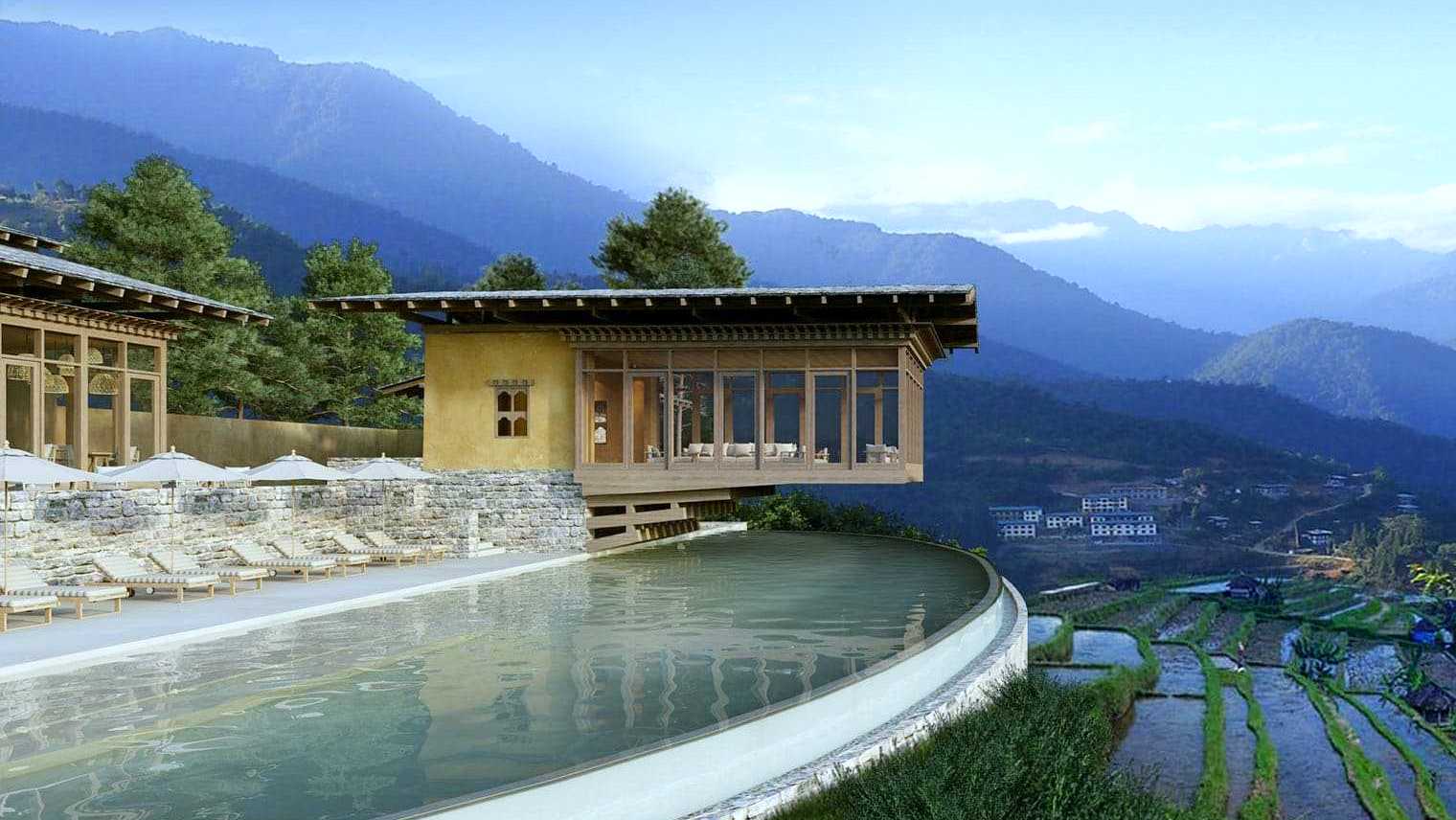
- Harmony with Nature: Bhutan's eco-friendly accommodations are strategically nestled amidst the country's stunning landscapes, providing travelers with an immersive experience in nature. From boutique lodges to traditional guesthouses, these establishments are designed to harmonize with the environment, offering tranquil retreats that leave minimal impact.
- Energy Efficiency and Renewable Energy: Sustainability is at the core of eco-friendly accommodations in Bhutan. These lodgings often employ energy-efficient practices, utilizing renewable energy sources such as solar power and hydropower to minimize their carbon footprint. Guests can enjoy modern amenities while knowing their stay aligns with environmentally conscious principles.
- Waste Reduction and Recycling Initiatives: Bhutanese eco-friendly accommodations actively participate in waste reduction and recycling programs. From composting organic waste to minimizing single-use plastics, these establishments are committed to responsible waste management, contributing to the overall cleanliness and sustainability of the destination.
- Local and Organic Cuisine: Culinary experiences in eco-friendly accommodations often emphasize locally sourced and organic ingredients. Guests can savor the flavors of Bhutan while supporting sustainable agriculture practices. Dining becomes not only a gastronomic delight but a celebration of Bhutanese commitment to environmental responsibility.
- Water Conservation Measures: In a country where water is a precious resource, eco-friendly accommodations implement water conservation measures. Guests are encouraged to participate in responsible water usage, and innovative technologies are often employed to reduce water consumption without compromising comfort.
- Cultural Sensitivity and Preservation: Eco-friendly accommodations in Bhutan understand the importance of cultural preservation. Many lodgings showcase traditional Bhutanese architecture, incorporating local materials and design elements. Guests experience the charm of Bhutan's heritage while contributing to the preservation of its cultural identity.
- Educational Initiatives: Eco-friendly accommodations go beyond providing a place to stay; they often engage in educational initiatives. Guests may have the opportunity to learn about Bhutan's commitment to sustainability, its unique biodiversity, and the steps taken to ensure responsible tourism practices.
- Certifications and Standards: Many eco-friendly accommodations in Bhutan adhere to internationally recognized eco-certifications and sustainability standards. This commitment to transparency ensures that travelers can make informed choices, selecting accommodations that align with their values.
Choosing eco-friendly accommodations in Bhutan is more than selecting a place to rest; it's a conscious decision to support a sustainable and responsible travel ethos. In Bhutan, each stay in an eco-friendly lodging is an invitation to connect with nature, immerse in local culture, and contribute to the kingdom's vision of a harmonious coexistence between tourism and the environment. Experience the serenity of Bhutan with a conscience, where every accommodation reflects a commitment to a greener, more sustainable world.
Bhutan's Wildlife Conservation Efforts
In the heart of the Eastern Himalayas, Bhutan not only captivates with its stunning landscapes but also stands as a guardian of biodiversity. The kingdom's commitment to wildlife conservation is woven into the fabric of its sustainable travel initiatives. Join us on an overview of Bhutan's wildlife conservation efforts, where responsible tourism becomes a vital force in preserving the natural heritage of this Himalayan jewel.
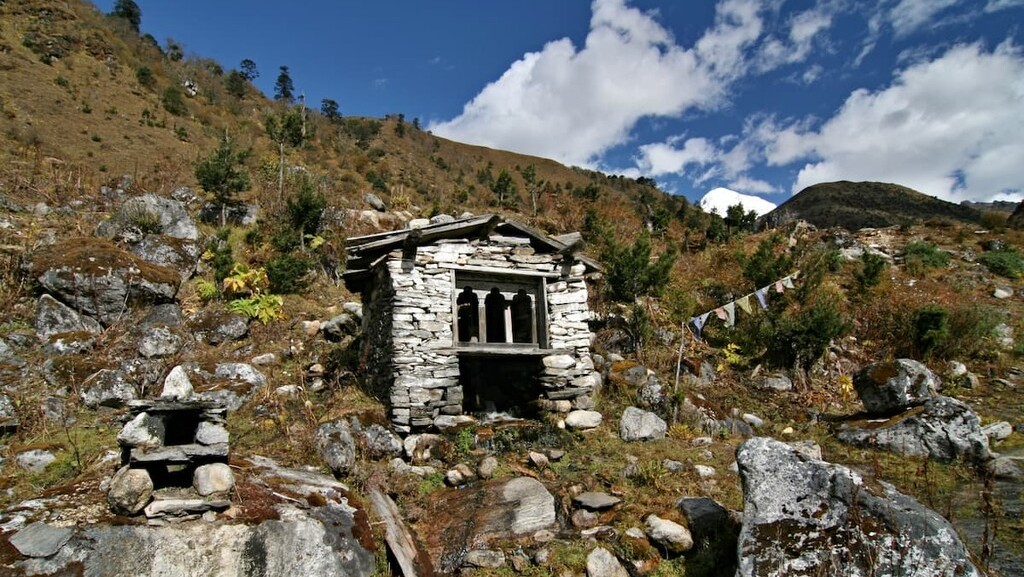
- Rich Biodiversity: Bhutan's landscapes, ranging from lush subtropical plains to towering alpine peaks, harbor a remarkable diversity of flora and fauna. The kingdom's commitment to wildlife conservation seeks to protect endangered species and maintain the ecological balance of these diverse ecosystems.
- Protected Areas and National Parks: Bhutan's extensive network of protected areas and national parks serves as havens for wildlife. These areas, carefully managed and monitored, provide essential habitats for iconic species such as the Bengal tiger, red panda, and snow leopard. Visitors can explore these protected zones with a sense of awe and responsibility.
- Anti-Poaching Initiatives: Bhutan has implemented robust anti-poaching measures to combat illegal wildlife trade. The Royal Bhutan Police and local communities collaborate to patrol and protect wildlife habitats, ensuring the safety of endangered species and contributing to the global fight against wildlife trafficking.
- Community Involvement in Conservation: Community-based conservation initiatives empower local residents to actively participate in and benefit from wildlife conservation efforts. By engaging communities in the protection of their natural surroundings, Bhutan ensures that the people living near wildlife habitats become stewards of these areas.
- Reduction of Human-Wildlife Conflict: Bhutan addresses the challenges of human-wildlife conflict by implementing strategies to minimize clashes between local communities and wildlife. Education programs, technological solutions, and community involvement contribute to harmonious coexistence, allowing both people and wildlife to thrive.
- Bird Watching and Conservation: With over 700 bird species, Bhutan is a paradise for bird watchers. The kingdom's commitment to avian conservation includes initiatives to protect endangered species and their habitats. Bird watching experiences are not only a delight for enthusiasts but also contribute to the awareness and preservation of Bhutan's diverse birdlife.
- Research and Monitoring Programs: Ongoing research and monitoring programs play a crucial role in Bhutan's wildlife conservation efforts. Collaborations with international organizations and the use of modern technologies help gather data on species populations, migration patterns, and the impact of climate change on wildlife.
- Conservation of Endangered Species: Bhutan's conservation efforts extend to endangered species such as the elusive snow leopard and the red panda. Specialized conservation programs focus on protecting these iconic species and ensuring their survival in their natural habitats.
Bhutan's commitment to wildlife conservation goes hand in hand with its vision of Gross National Happiness and sustainable travel. As a visitor to this Himalayan kingdom, your journey becomes not only an exploration of breathtaking landscapes but a meaningful contribution to the preservation of Bhutan's rich biodiversity. In Bhutan, sustainable travel isn't just about leaving a small footprint; it's about actively participating in the protection of a delicate and awe-inspiring natural world.
Fair Trade and Local Crafts
Bhutan, a kingdom steeped in culture and tradition, is not just a destination for picturesque landscapes but also a haven for artisans preserving age-old crafts. In the realm of sustainable travel, Bhutan shines as a beacon for fair trade practices and the promotion of local crafts. Join us on an overview of how Bhutan seamlessly intertwines cultural heritage, fair trade, and sustainable tourism, offering travelers an enriching experience while supporting local communities.
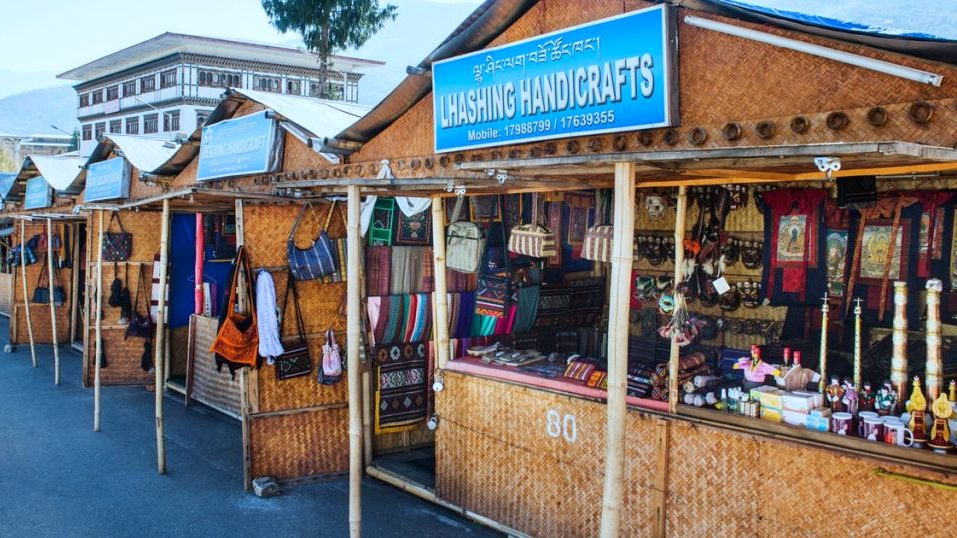
- Cultural Riches in Handcrafted Treasures: Bhutan's traditional arts and crafts reflect the country's rich cultural heritage. Intricately woven textiles, wood carvings, and vibrant paintings are not just artistic expressions but a living testament to Bhutanese identity. Fair trade practices ensure that these crafts are not only preserved but also contribute to the well-being of the artisans.
- Fair Trade Initiatives: Bhutan embraces fair trade principles, ensuring that artisans receive fair compensation for their craftsmanship. This commitment extends to cooperatives and community-based organizations, empowering local communities economically and socially. Visitors engaging in fair trade purchases directly support the artisans and their families.
- Traditional Textiles: Bhutanese textiles are renowned for their exquisite craftsmanship and vibrant designs. From handwoven fabrics to intricate patterns, each piece tells a story of tradition and skill. Travelers have the opportunity to purchase textiles created through fair trade initiatives, supporting the livelihoods of weavers and preserving this integral aspect of Bhutanese culture.
- Woodwork and Carpentry: Bhutanese woodwork, often seen in the intricate carvings of dzongs (fortresses) and monasteries, is a testament to the country's craftsmanship. Fair trade practices ensure that the art of wood carving is sustained, and travelers can acquire pieces directly from artisans or cooperatives, fostering a connection between creator and consumer.
- Ceramics and Pottery: Bhutanese pottery, with its unique designs and traditional motifs, reflects the country's artistic heritage. Fair trade initiatives support local potters, encouraging the continuation of these age-old practices. Travelers can explore pottery workshops, engage with artisans, and take home one-of-a-kind pieces.
- Painting and Thangka Art: Thangka paintings, intricate religious artworks, are a significant part of Bhutanese culture. Fair trade practices ensure that thangka artists receive fair compensation for their skillful creations. Visitors can witness the artistry involved in thangka painting and acquire pieces that contribute to the continuation of this revered craft.
- Market Experiences and Cultural Exchange: Bhutanese markets, like the one in Thimphu, provide immersive experiences for travelers. Fair trade products are often showcased, allowing visitors to engage with artisans, learn about traditional crafts, and purchase authentic souvenirs with the assurance that their purchases support local communities.
- Preserving Cultural Identity: Fair trade and local crafts in Bhutan are not just economic activities; they are integral to preserving the country's cultural identity. By supporting artisans through fair trade, travelers actively participate in the safeguarding of Bhutanese traditions for future generations.
Bhutan's commitment to fair trade and local crafts transforms the act of purchasing souvenirs into a meaningful cultural exchange. In the kingdom of happiness, sustainable travel isn't just about exploring landscapes; it's about becoming a patron of cultural preservation and a supporter of artisans who are the guardians of Bhutan's rich heritage. As you journey through Bhutan, let each handcrafted treasure be a link between past and present, between artisans and admirers, creating a sustainable legacy of cultural richness.
Practical Tips for Sustainable Travelers
Embarking on a sustainable journey in Bhutan requires mindful choices and a commitment to minimizing your environmental impact while maximizing positive contributions to local communities. Here are practical tips for sustainable travelers exploring the Kingdom of Bhutan:
